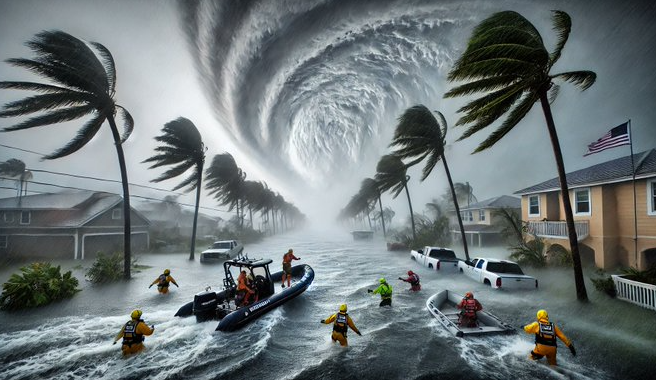Hurricane Debby made landfall early Monday morning along Florida’s Big Bend, unleashing a barrage of flooding rain, damaging winds, and life-threatening storm surge. The Category 1 hurricane hit near Steinhatchee around 7 a.m. ET, with winds estimated at 80 mph. Following landfall, power outages surged, affecting over 250,000 utility customers across the Sunshine State.
The storm, which intensified into a Category 1 hurricane late Sunday, has been moving slowly across Florida, bringing with it winds of 80 mph and potentially up to 30 inches (76 cm) of rain as it progresses northward. The National Hurricane Center (NHC) forecasts that Debby will also impact Georgia and South Carolina in the coming days.
Jamie Rhome, deputy director of the NHC, warned of the potential for historic rainfall, stating, “You’re talking about catastrophic flooding.” As of now, around 204,000 homes and businesses in Florida are without power, according to PowerOutage.com.
Debby is expected to slow significantly as it continues across Florida due to the weakening of high-altitude steering winds. The hurricane is forecast to drift out over the Atlantic as a tropical storm, continuing to bring heavy rain to southeast Georgia and the Carolinas on Tuesday and Wednesday before moving inland over South Carolina on Thursday.
The prolonged rainfall could lead to severe flooding, compounded by a storm surge that may trap water in river systems, preventing drainage into the ocean. Ahead of landfall, Florida Governor Ron DeSantis declared a state of emergency for 61 of Florida’s 67 counties, with utility crews mobilized to restore power post-storm.
Residents across the state are bracing for the impact. Spyridon Aibejeris, whose home in Keaton Beach had just been repaired from Hurricane Idalia last summer, expressed his weariness: “Man, I’ve done this so many times. You just go back and see what you’ve got to do. I hope I don’t have to go back to that again.”
By midweek, Debby is expected to dump nearly 2 feet of rain in parts of Georgia and South Carolina, leading to extreme flooding. The NHC is predicting “potentially historic rainfall” across southeastern Georgia and South Carolina through Friday, which could cause widespread flash flooding and life-threatening conditions.
In anticipation, the governors of Florida, Georgia, and South Carolina have all declared states of emergency, urging residents to prepare for the storm’s multiple impacts.
Before making landfall, Debby had already caused significant flooding and damage across Florida. Fort Myers reported several feet of flooding, while in St. Petersburg, strong waves and tropical-storm-force winds battered the coast. With the storm now moving inland, it is expected to continue bringing severe rain and hazardous conditions to Georgia and the Carolinas.
Key Points:
- Landfall and Impact: Hurricane Debby made landfall early Monday morning near Steinhatchee, Florida, as a Category 1 hurricane with winds of 80 mph. The storm has caused significant flooding, damaging winds, and life-threatening storm surge.
- Power Outages: Over 250,000 utility customers in Florida are without power due to the storm.
- Rainfall and Flooding: Debby is expected to bring up to 30 inches (76 cm) of rain across Florida, with historic rainfall predicted for southeastern Georgia and South Carolina, leading to potentially catastrophic flooding.
- Storm Movement: The hurricane is moving slowly across Florida and is forecast to drift out over the Atlantic as a tropical storm. It will continue to impact southeast Georgia and the Carolinas in the coming days.
- Emergency Declarations: Florida Governor Ron DeSantis has declared a state of emergency for 61 counties in Florida. Georgia and South Carolina have also declared states of emergency in anticipation of the storm’s impact.
- Preparation and Response: Utility crews from within and outside the state are mobilized to restore power. Residents, including those recently affected by Hurricane Idalia, are preparing for Debby’s impact.
- Ongoing Effects: The storm has already caused severe flooding and damage across Florida. The slow movement of Debby could exacerbate flooding issues, with the potential for water to be trapped in river systems due to storm surge.
- Forecast: Debby is expected to continue causing heavy rain and hazardous conditions in Georgia and the Carolinas, with significant flooding and storm surge likely as it progresses.



